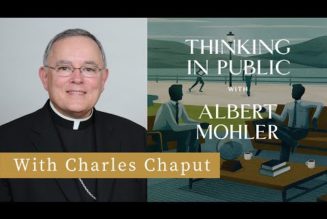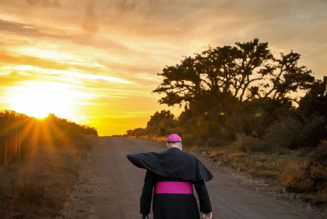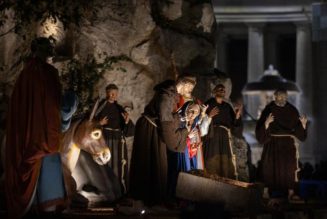What is the focus of a Catholic vision of renewal for education? Rather than “classical,” our focus should be on the Christian tradition following the Church’s own educational vision. The goal should be to teach from a Catholic worldview, rooted within the great Catholic heritage of thought and culture.
Words Made Flesh: The Sacramental Mission of Catholic Education, by R. Jared Staudt (Catholic Education Press, 2024, 200 pages)
 A sacramental approach to education flows from the Incarnation: “The Word became flesh” (Jn 1:14). The Word (the Logos) is the Truth itself, the one spoken forth by the Father in eternity and through whom all that is made comes into being. Made in the image and likeness of God, human beings have a mind (a logos) like the Word, capable of receiving his truth and expressing our own words in response. Human beings are called to an everlasting dialogue with the Father through the Word made flesh, and Catholic education should be considered from this eternal vantage point. The Church educates because God has called us to know him, to love him, to receive his Word, and to respond. The Word does not speak to us only through written or spoken words, however, as he himself has become flesh, manifesting God to us tangibly in the world. He continues to offer his flesh to us in the Eucharist, drawing us into his body as his members in the world.
A sacramental approach to education flows from the Incarnation: “The Word became flesh” (Jn 1:14). The Word (the Logos) is the Truth itself, the one spoken forth by the Father in eternity and through whom all that is made comes into being. Made in the image and likeness of God, human beings have a mind (a logos) like the Word, capable of receiving his truth and expressing our own words in response. Human beings are called to an everlasting dialogue with the Father through the Word made flesh, and Catholic education should be considered from this eternal vantage point. The Church educates because God has called us to know him, to love him, to receive his Word, and to respond. The Word does not speak to us only through written or spoken words, however, as he himself has become flesh, manifesting God to us tangibly in the world. He continues to offer his flesh to us in the Eucharist, drawing us into his body as his members in the world.
Catholic education must be sacramental in this deepest sense of drawing students into the reality of the Incarnation, helping them to encounter the Word made flesh and to live in communion with him. This requires a lived experience of the Word in his community, the Church, which continues Christ’s incarnate presence in the world. Learning the truth is not enough, as it must be lived as a sacramental reality in the world, becoming the center of the Christian life, and a culture, a shared way of life with others. The “words” of Catholic education must become flesh in the lived experience of the student, becoming a response to God’s movement toward them in the Incarnation. Just as the created world has been given to us as a gift from God, so the life of Catholic students should order these gifts back to God, sanctifying the world. Like the Word, our own words should express the truth of God and translate them into our work, giving them concrete expression.
A sacramental approach, therefore, takes the outward expressions of education just as seriously as the inward attention to the mind. The liberal arts focus on the cultivation and perfection of the intellect, but education as a whole seeks to form the entire person according to the model of the Word made flesh. The typical utilitarian approach to education has lost sight of the formation of the mind, but it also does not engage the body seriously enough. Catholic education can teach the ideas and books that matter most, while also helping students to act upon them, learning to live in accord with the truth. A sacramental approach can recover what we have lost in leaving the liberal arts behind while also achieving what a utilitarian approach tries to accomplish. In fostering the application of study, it can incorporate a hands-on approach through the arts, tangible work experience, and fostering relationships within a community. A Catholic approach, universal and holistic, can form the whole person, communicating truth, inspiring through beauty, and leading students into a life in accord with what is truly good.
This book proposes a sacramental vision of renewal, uniting interior formation with the building of a strong faith-based culture. Chapter one begins by looking at why we need Catholic schools in light of the challenges in the public schools and the limits of charter schools. Only Catholic schools can guide students to their true goal of human happiness in light of both faith and reason. Chapter two looks at how Catholic schools can form disciples more effectively, helping its students to come to faith, grow in maturity, and embrace mission. Chapter three examines the essential role of parents, who have the primary influence on the faith life of their children and can partner with schools more effectively. Chapter four lays out a vision for the entire curriculum united with a Catholic worldview, which imparts a way of viewing reality as a whole. Chapter five examines how books should be chosen and taught in the Catholic school in light of its mission to open students to the truth and to inspire the imagination. Chapter six, which lays out the heart of this book’s pedagogical approach, explores the failed principles of progressive education, and how, nonetheless, some of their aims could be better fulfilled through a poetic pedagogy. Chapter seven presents the role of the Catholic school in recovering Catholic history, including a deeper literacy of essential Catholic figures, events, achievements, and places. Chapter eight looks at how the universal Catholic tradition respects the diversity of human cultures throughout the world while uniting them in a shared narrative of salvation history. Chapter nine makes a case for using Latin to increase literacy, both in a grammatical and a cultural sense. Chapter ten speaks of how beauty can inspire students in their learning by drawing upon the great achievements of the Catholic tradition. Chapter eleven examines the challenges presented by technology and how schools can respond by fostering silent contemplation. Chapter twelve offers practical suggestions for renewal, especially through formation for leaders and teachers and the renewal of schools and diocesan structures. Finally, the conclusion explores the way in which culture takes shape in the school, most significantly through the centrality of the Eucharist in Catholic education.
Before we begin, I want to respond to a possible objection: “Is your vision of renewal simply imposing classical education?” The word “classical” implies that we are emphasizing classical thought, language, and culture. The Church has always been dialoguing with classical culture as a continuing source of inspiration, but the “classical” element is not essential to the liberal arts. We do not need our schools to teach classical languages or to root the liberal arts primarily in classical culture or thought. It is not necessary to require Latin (although I will make a case for its study), Euclidean geometry, Homer, or Plato. We should, however, teach Greek and Roman history as part of the larger story of Western civilization, though not as the primary anchor. What is the focus, then, of a Catholic vision of renewal for education? Rather than “classical,” our focus should be on the Christian tradition following the Church’s own educational vision. The goal should be to teach from a Catholic worldview, rooted within the great Catholic heritage of thought and culture.
The above constitutes part of the Introduction to Words Made Flesh: The Sacramental Mission of Catholic Education.
The Imaginative Conservative applies the principle of appreciation to the discussion of culture and politics—we approach dialogue with magnanimity rather than with mere civility. Will you help us remain a refreshing oasis in the increasingly contentious arena of modern discourse? Please consider donating now.
Share This Story, Choose Your Platform!
:root{–wp–preset–aspect-ratio–square: 1;–wp–preset–aspect-ratio–4-3: 4/3;–wp–preset–aspect-ratio–3-4: 3/4;–wp–preset–aspect-ratio–3-2: 3/2;–wp–preset–aspect-ratio–2-3: 2/3;–wp–preset–aspect-ratio–16-9: 16/9;–wp–preset–aspect-ratio–9-16: 9/16;–wp–preset–color–black: #000000;–wp–preset–color–cyan-bluish-gray: #abb8c3;–wp–preset–color–white: #ffffff;–wp–preset–color–pale-pink: #f78da7;–wp–preset–color–vivid-red: #cf2e2e;–wp–preset–color–luminous-vivid-orange: #ff6900;–wp–preset–color–luminous-vivid-amber: #fcb900;–wp–preset–color–light-green-cyan: #7bdcb5;–wp–preset–color–vivid-green-cyan: #00d084;–wp–preset–color–pale-cyan-blue: #8ed1fc;–wp–preset–color–vivid-cyan-blue: #0693e3;–wp–preset–color–vivid-purple: #9b51e0;–wp–preset–color–awb-color-1: rgba(255,255,255,1);–wp–preset–color–awb-color-2: rgba(246,246,246,1);–wp–preset–color–awb-color-3: rgba(224,222,222,1);–wp–preset–color–awb-color-4: rgba(233,168,37,1);–wp–preset–color–awb-color-5: rgba(116,116,116,1);–wp–preset–color–awb-color-6: rgba(120,85,16,1);–wp–preset–color–awb-color-7: rgba(62,62,62,1);–wp–preset–color–awb-color-8: rgba(51,51,51,1);–wp–preset–color–awb-color-custom-10: rgba(174,137,93,1);–wp–preset–color–awb-color-custom-11: rgba(192,153,107,1);–wp–preset–color–awb-color-custom-12: rgba(190,189,189,1);–wp–preset–color–awb-color-custom-13: rgba(62,62,62,0.8);–wp–preset–color–awb-color-custom-14: rgba(68,68,68,1);–wp–preset–color–awb-color-custom-15: rgba(221,221,221,1);–wp–preset–color–awb-color-custom-16: rgba(232,232,232,1);–wp–preset–color–awb-color-custom-17: rgba(249,249,249,1);–wp–preset–color–awb-color-custom-18: rgba(229,229,229,1);–wp–preset–gradient–vivid-cyan-blue-to-vivid-purple: linear-gradient(135deg,rgba(6,147,227,1) 0%,rgb(155,81,224) 100%);–wp–preset–gradient–light-green-cyan-to-vivid-green-cyan: linear-gradient(135deg,rgb(122,220,180) 0%,rgb(0,208,130) 100%);–wp–preset–gradient–luminous-vivid-amber-to-luminous-vivid-orange: linear-gradient(135deg,rgba(252,185,0,1) 0%,rgba(255,105,0,1) 100%);–wp–preset–gradient–luminous-vivid-orange-to-vivid-red: linear-gradient(135deg,rgba(255,105,0,1) 0%,rgb(207,46,46) 100%);–wp–preset–gradient–very-light-gray-to-cyan-bluish-gray: linear-gradient(135deg,rgb(238,238,238) 0%,rgb(169,184,195) 100%);–wp–preset–gradient–cool-to-warm-spectrum: linear-gradient(135deg,rgb(74,234,220) 0%,rgb(151,120,209) 20%,rgb(207,42,186) 40%,rgb(238,44,130) 60%,rgb(251,105,98) 80%,rgb(254,248,76) 100%);–wp–preset–gradient–blush-light-purple: linear-gradient(135deg,rgb(255,206,236) 0%,rgb(152,150,240) 100%);–wp–preset–gradient–blush-bordeaux: linear-gradient(135deg,rgb(254,205,165) 0%,rgb(254,45,45) 50%,rgb(107,0,62) 100%);–wp–preset–gradient–luminous-dusk: linear-gradient(135deg,rgb(255,203,112) 0%,rgb(199,81,192) 50%,rgb(65,88,208) 100%);–wp–preset–gradient–pale-ocean: linear-gradient(135deg,rgb(255,245,203) 0%,rgb(182,227,212) 50%,rgb(51,167,181) 100%);–wp–preset–gradient–electric-grass: linear-gradient(135deg,rgb(202,248,128) 0%,rgb(113,206,126) 100%);–wp–preset–gradient–midnight: linear-gradient(135deg,rgb(2,3,129) 0%,rgb(40,116,252) 100%);–wp–preset–font-size–small: 11.25px;–wp–preset–font-size–medium: 20px;–wp–preset–font-size–large: 22.5px;–wp–preset–font-size–x-large: 42px;–wp–preset–font-size–normal: 15px;–wp–preset–font-size–xlarge: 30px;–wp–preset–font-size–huge: 45px;–wp–preset–spacing–20: 0.44rem;–wp–preset–spacing–30: 0.67rem;–wp–preset–spacing–40: 1rem;–wp–preset–spacing–50: 1.5rem;–wp–preset–spacing–60: 2.25rem;–wp–preset–spacing–70: 3.38rem;–wp–preset–spacing–80: 5.06rem;–wp–preset–shadow–natural: 6px 6px 9px rgba(0, 0, 0, 0.2);–wp–preset–shadow–deep: 12px 12px 50px rgba(0, 0, 0, 0.4);–wp–preset–shadow–sharp: 6px 6px 0px rgba(0, 0, 0, 0.2);–wp–preset–shadow–outlined: 6px 6px 0px -3px rgba(255, 255, 255, 1), 6px 6px rgba(0, 0, 0, 1);–wp–preset–shadow–crisp: 6px 6px 0px rgba(0, 0, 0, 1);}:where(.is-layout-flex){gap: 0.5em;}:where(.is-layout-grid){gap: 0.5em;}body .is-layout-flex{display: flex;}.is-layout-flex{flex-wrap: wrap;align-items: center;}.is-layout-flex > :is(*, div){margin: 0;}body .is-layout-grid{display: grid;}.is-layout-grid > :is(*, div){margin: 0;}:where(.wp-block-columns.is-layout-flex){gap: 2em;}:where(.wp-block-columns.is-layout-grid){gap: 2em;}:where(.wp-block-post-template.is-layout-flex){gap: 1.25em;}:where(.wp-block-post-template.is-layout-grid){gap: 1.25em;}.has-black-color{color: var(–wp–preset–color–black) !important;}.has-cyan-bluish-gray-color{color: var(–wp–preset–color–cyan-bluish-gray) !important;}.has-white-color{color: var(–wp–preset–color–white) !important;}.has-pale-pink-color{color: var(–wp–preset–color–pale-pink) !important;}.has-vivid-red-color{color: var(–wp–preset–color–vivid-red) !important;}.has-luminous-vivid-orange-color{color: var(–wp–preset–color–luminous-vivid-orange) !important;}.has-luminous-vivid-amber-color{color: var(–wp–preset–color–luminous-vivid-amber) !important;}.has-light-green-cyan-color{color: var(–wp–preset–color–light-green-cyan) !important;}.has-vivid-green-cyan-color{color: var(–wp–preset–color–vivid-green-cyan) !important;}.has-pale-cyan-blue-color{color: var(–wp–preset–color–pale-cyan-blue) !important;}.has-vivid-cyan-blue-color{color: var(–wp–preset–color–vivid-cyan-blue) !important;}.has-vivid-purple-color{color: var(–wp–preset–color–vivid-purple) !important;}.has-black-background-color{background-color: var(–wp–preset–color–black) !important;}.has-cyan-bluish-gray-background-color{background-color: var(–wp–preset–color–cyan-bluish-gray) !important;}.has-white-background-color{background-color: var(–wp–preset–color–white) !important;}.has-pale-pink-background-color{background-color: var(–wp–preset–color–pale-pink) !important;}.has-vivid-red-background-color{background-color: var(–wp–preset–color–vivid-red) !important;}.has-luminous-vivid-orange-background-color{background-color: var(–wp–preset–color–luminous-vivid-orange) !important;}.has-luminous-vivid-amber-background-color{background-color: var(–wp–preset–color–luminous-vivid-amber) !important;}.has-light-green-cyan-background-color{background-color: var(–wp–preset–color–light-green-cyan) !important;}.has-vivid-green-cyan-background-color{background-color: var(–wp–preset–color–vivid-green-cyan) !important;}.has-pale-cyan-blue-background-color{background-color: var(–wp–preset–color–pale-cyan-blue) !important;}.has-vivid-cyan-blue-background-color{background-color: var(–wp–preset–color–vivid-cyan-blue) !important;}.has-vivid-purple-background-color{background-color: var(–wp–preset–color–vivid-purple) !important;}.has-black-border-color{border-color: var(–wp–preset–color–black) !important;}.has-cyan-bluish-gray-border-color{border-color: var(–wp–preset–color–cyan-bluish-gray) !important;}.has-white-border-color{border-color: var(–wp–preset–color–white) !important;}.has-pale-pink-border-color{border-color: var(–wp–preset–color–pale-pink) !important;}.has-vivid-red-border-color{border-color: var(–wp–preset–color–vivid-red) !important;}.has-luminous-vivid-orange-border-color{border-color: var(–wp–preset–color–luminous-vivid-orange) !important;}.has-luminous-vivid-amber-border-color{border-color: var(–wp–preset–color–luminous-vivid-amber) !important;}.has-light-green-cyan-border-color{border-color: var(–wp–preset–color–light-green-cyan) !important;}.has-vivid-green-cyan-border-color{border-color: var(–wp–preset–color–vivid-green-cyan) !important;}.has-pale-cyan-blue-border-color{border-color: var(–wp–preset–color–pale-cyan-blue) !important;}.has-vivid-cyan-blue-border-color{border-color: var(–wp–preset–color–vivid-cyan-blue) !important;}.has-vivid-purple-border-color{border-color: var(–wp–preset–color–vivid-purple) !important;}.has-vivid-cyan-blue-to-vivid-purple-gradient-background{background: var(–wp–preset–gradient–vivid-cyan-blue-to-vivid-purple) !important;}.has-light-green-cyan-to-vivid-green-cyan-gradient-background{background: var(–wp–preset–gradient–light-green-cyan-to-vivid-green-cyan) !important;}.has-luminous-vivid-amber-to-luminous-vivid-orange-gradient-background{background: var(–wp–preset–gradient–luminous-vivid-amber-to-luminous-vivid-orange) !important;}.has-luminous-vivid-orange-to-vivid-red-gradient-background{background: var(–wp–preset–gradient–luminous-vivid-orange-to-vivid-red) !important;}.has-very-light-gray-to-cyan-bluish-gray-gradient-background{background: var(–wp–preset–gradient–very-light-gray-to-cyan-bluish-gray) !important;}.has-cool-to-warm-spectrum-gradient-background{background: var(–wp–preset–gradient–cool-to-warm-spectrum) !important;}.has-blush-light-purple-gradient-background{background: var(–wp–preset–gradient–blush-light-purple) !important;}.has-blush-bordeaux-gradient-background{background: var(–wp–preset–gradient–blush-bordeaux) !important;}.has-luminous-dusk-gradient-background{background: var(–wp–preset–gradient–luminous-dusk) !important;}.has-pale-ocean-gradient-background{background: var(–wp–preset–gradient–pale-ocean) !important;}.has-electric-grass-gradient-background{background: var(–wp–preset–gradient–electric-grass) !important;}.has-midnight-gradient-background{background: var(–wp–preset–gradient–midnight) !important;}.has-small-font-size{font-size: var(–wp–preset–font-size–small) !important;}.has-medium-font-size{font-size: var(–wp–preset–font-size–medium) !important;}.has-large-font-size{font-size: var(–wp–preset–font-size–large) !important;}.has-x-large-font-size{font-size: var(–wp–preset–font-size–x-large) !important;}
:where(.wp-block-post-template.is-layout-flex){gap: 1.25em;}:where(.wp-block-post-template.is-layout-grid){gap: 1.25em;}
:where(.wp-block-columns.is-layout-flex){gap: 2em;}:where(.wp-block-columns.is-layout-grid){gap: 2em;}
:root :where(.wp-block-pullquote){font-size: 1.5em;line-height: 1.6;}
.wp-block-audio :where(figcaption){color:#555;font-size:13px;text-align:center}.is-dark-theme .wp-block-audio :where(figcaption){color:#ffffffa6}.wp-block-audio{margin:0 0 1em}.wp-block-code{border:1px solid #ccc;border-radius:4px;font-family:Menlo,Consolas,monaco,monospace;padding:.8em 1em}.wp-block-embed :where(figcaption){color:#555;font-size:13px;text-align:center}.is-dark-theme .wp-block-embed :where(figcaption){color:#ffffffa6}.wp-block-embed{margin:0 0 1em}.blocks-gallery-caption{color:#555;font-size:13px;text-align:center}.is-dark-theme .blocks-gallery-caption{color:#ffffffa6}:root :where(.wp-block-image figcaption){color:#555;font-size:13px;text-align:center}.is-dark-theme :root :where(.wp-block-image figcaption){color:#ffffffa6}.wp-block-image{margin:0 0 1em}.wp-block-pullquote{border-bottom:4px solid;border-top:4px solid;color:currentColor;margin-bottom:1.75em}.wp-block-pullquote cite,.wp-block-pullquote footer,.wp-block-pullquote__citation{color:currentColor;font-size:.8125em;font-style:normal;text-transform:uppercase}.wp-block-quote{border-left:.25em solid;margin:0 0 1.75em;padding-left:1em}.wp-block-quote cite,.wp-block-quote footer{color:currentColor;font-size:.8125em;font-style:normal;position:relative}.wp-block-quote.has-text-align-right{border-left:none;border-right:.25em solid;padding-left:0;padding-right:1em}.wp-block-quote.has-text-align-center{border:none;padding-left:0}.wp-block-quote.is-large,.wp-block-quote.is-style-large,.wp-block-quote.is-style-plain{border:none}.wp-block-search .wp-block-search__label{font-weight:700}.wp-block-search__button{border:1px solid #ccc;padding:.375em .625em}:where(.wp-block-group.has-background){padding:1.25em 2.375em}.wp-block-separator.has-css-opacity{opacity:.4}.wp-block-separator{border:none;border-bottom:2px solid;margin-left:auto;margin-right:auto}.wp-block-separator.has-alpha-channel-opacity{opacity:1}.wp-block-separator:not(.is-style-wide):not(.is-style-dots){width:100px}.wp-block-separator.has-background:not(.is-style-dots){border-bottom:none;height:1px}.wp-block-separator.has-background:not(.is-style-wide):not(.is-style-dots){height:2px}.wp-block-table{margin:0 0 1em}.wp-block-table td,.wp-block-table th{word-break:normal}.wp-block-table :where(figcaption){color:#555;font-size:13px;text-align:center}.is-dark-theme .wp-block-table :where(figcaption){color:#ffffffa6}.wp-block-video :where(figcaption){color:#555;font-size:13px;text-align:center}.is-dark-theme .wp-block-video :where(figcaption){color:#ffffffa6}.wp-block-video{margin:0 0 1em}:root :where(.wp-block-template-part.has-background){margin-bottom:0;margin-top:0;padding:1.25em 2.375em}
/*! This file is auto-generated */
.wp-block-button__link{color:#fff;background-color:#32373c;border-radius:9999px;box-shadow:none;text-decoration:none;padding:calc(.667em + 2px) calc(1.333em + 2px);font-size:1.125em}.wp-block-file__button{background:#32373c;color:#fff;text-decoration:none}











